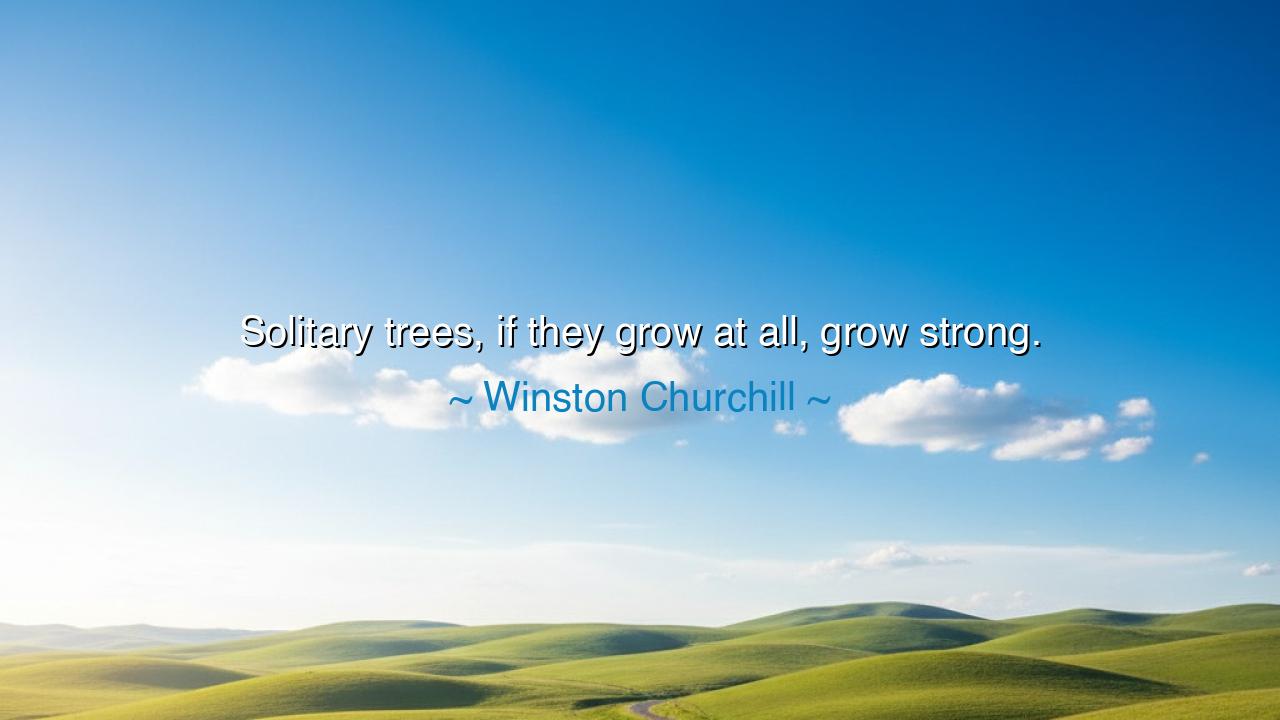
Solitary trees, if they grow at all, grow strong.






Hear the words of Winston Churchill, the lion of Britain, who declared: “Solitary trees, if they grow at all, grow strong.” In this image, simple yet thunderous, lies a vision of endurance and character. The solitary tree, standing alone against storm and wind, does not lean upon a forest for shelter. It must draw deeper into the earth, strengthen its trunk, spread its roots wide, or perish. If it survives, it becomes mighty, tested by hardship, hardened by solitude, and lifted high above the plains.
The origin of this saying is found in Churchill’s own life. He was no stranger to isolation, often standing alone when others faltered. Before the Second World War, when many sought appeasement with tyranny, Churchill’s was a solitary voice, warning of the gathering storm. He was mocked, ignored, and left on the margins. Yet like the solitary oak battered by winds, he drew strength from the struggle. When at last the hurricane of war broke, he stood unmoved, a great tree whose roots were too deep to be torn up. Thus his words were not only metaphor, but autobiography.
History gives us countless examples of this truth. Consider Abraham Lincoln, who rose from poverty and loneliness, often self-taught, often scorned. He was a solitary tree, growing without the shelter of privilege, relying only on the soil of his conviction. By the time he led a divided nation through civil war, his strength was like ironwood, forged by years of isolation and struggle. His solitude became his strength, and his legacy, like a tree, casts its shade across generations.
Yet this teaching is not without warning. Churchill’s words are clear: “if they grow at all.” Many solitary trees wither before they reach the sky. Solitude can break as well as forge; it is a trial that does not always end in triumph. Only the soul that draws deeply upon truth, patience, and endurance will thrive. The winds of isolation can scatter the weak, but they carve greatness into the strong. Thus the saying is both heroic and solemn: survival in solitude is rare, but when it comes, it yields unmatched power.
The meaning, then, is both personal and universal. The solitary tree is each of us when we walk alone—when we face trial without comfort, when we must choose truth though others jeer, when we must hold fast though none stand beside us. In these moments, we are tested. If we endure, we grow strong, for strength is not born in ease, but in resistance. The solitary path is the crucible of greatness.
The lesson for you, listener, is clear: do not fear being alone. If truth demands it, stand like the solitary tree against the storm. Draw your roots into conviction, your strength from integrity, your courage from faith. Do not measure yourself by the shelter of crowds, but by the depth of your endurance. Remember that the greatest oaks grew first as solitary saplings, scorned or overlooked, until the day came when their strength was revealed.
Practical actions follow: when you feel isolated, do not despair, but see it as training for strength. Seek to deepen your roots—in wisdom, in virtue, in patience. Resist the temptation to abandon your principles for the comfort of the crowd. And when the winds come, do not curse them, for they are shaping you. In time, you may become a mighty tree, standing firm not only for yourself but offering shade and shelter to many.
So let Churchill’s words guide you: “Solitary trees, if they grow at all, grow strong.” Embrace solitude not as punishment but as preparation. Stand firm when others bend. And know that though the lonely path is hard, it forges a strength the sheltered will never know. In this, you will live as the ancients taught: rooted deep, unyielding in storm, rising strong toward the heavens.






AAdministratorAdministrator
Welcome, honored guests. Please leave a comment, we will respond soon